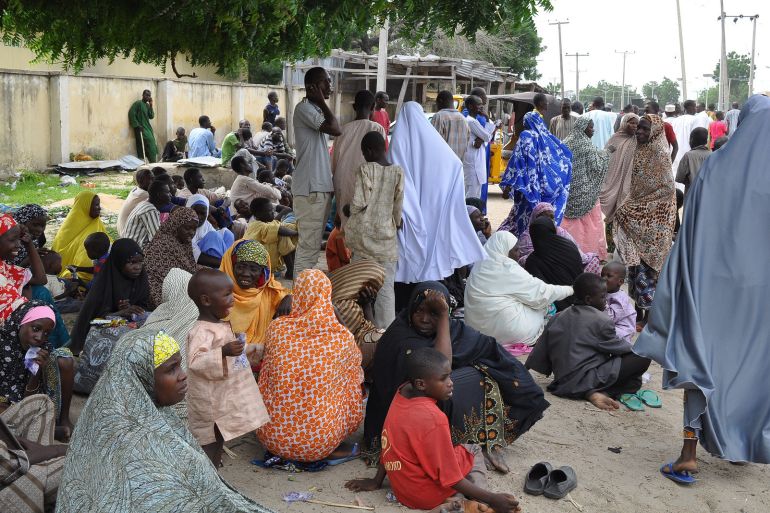Ukraine war diverts attention from Nigeria’s humanitarian crisis
Millions of people affected by Boko Haram’s armed campaign in northeastern Nigeria are in need of urgent humanitarian aid.

Bama, Nigeria – Inside a school-turned-internal displacement camp in Bama, a town in northeastern Nigeria’s Borno state, Modu Aji sits inside one of the hundreds of tents dotting the site.
The 45-year-old tailor is among the thousands to have found refuge here after fleeing a 2014 attack on the town by Boko Haram, an armed group that has been waging an armed campaign in the region for more than a decade.
Keep reading
list of 4 itemsAs Israel attacked Gaza’s north, 26 members of his family were wiped out
What is Trident, the US floating pier off Gaza? Will it work?
Does Israel’s Netanyahu have a plan for a ‘day after’ the war on Gaza?
Hundreds of people were killed in the assault. The Boko Haram fighters also destroyed houses, including Aji’s. His thriving tailoring store was set ablaze, too.
“I doubt I will ever recover from my losses, the shop and sewing machines,” Aji said at the camp at the Government Senior Science Secondary School (GSSSS).
“I lost everything.”
Aji is one of the 5.5 million people in the region in need of urgent humanitarian assistance, according to the United Nations.
The world body’s Office for the Coordination of Humanitarian Affairs (OCHA) has this year appealed for more than $1bn to provide aid but has managed to raise only about 40 percent of the sum – partly because international donors have shifted attention to countries like Ukraine, which has been fighting off a Russian invasion since late February.
“The war in Ukraine is the dominating crisis that takes attention from places like Nigeria,” said Matthias Schmale, UN resident and humanitarian coordinator in Nigeria.
“We are competing for attention, and that’s the worry.”
Overall, some 8.4 million people, primarily women and children, in Borno, Adamawa and Yobe states need humanitarian assistance, according to OCHA.
“We will see more children and adults dying if we don’t provide the minimum humanitarian support,” Schmale said. “So, if we don’t get the financial support we need for at least food, serious hunger will be the consequence for thousands of people.”
Camp closures
Tens of thousands of people have been killed and millions have become internally displaced since Boko Haram launched its campaign in 2009, creating one of the world’s worst humanitarian crises and causing a near-total breakdown in educational and healthcare services.
Across the northeastern region, the violence has destroyed schools, hospitals and other social amenities, leaving the affected communities – especially women and children – in dire need of help.
In previous years, people seeking refuge from the fighting stayed in unofficial settlements and government-run camps for internally displaced persons (IDPs) in Maiduguri, the capital of Borno state and the epicentre of humanitarian efforts.
But in 2020, Borno state officials started closing the camps in the city amid a rise in criminal activities, including drugs and prostitution. State authorities said it was necessary to close the centres to give IDPs dignity and purpose. Thousands of IDPs have since left Maiduguri and sought refuge elsewhere in neighbouring towns such as Bama.
Adisat Konto is one of them.
Konto was 32 years old and a mother of three when Boko Haram in 2014 briefly seized her village of Wnilibari, in Bama. The armed group’s members shot her husband, killed her first son for stealing and took captive her daughter captive, whom they married off to one of the fighters.
“My son was caught stealing groundnut and was killed by the Boko Haram soldiers,” Konto said at the GSSSS camp. “Then they turned to my husband, saying he didn’t train his son well, and he was shot by the side.
“He died after a month in my arms.”
Cash-strapped and hungry, Konto has difficulty supporting herself and her son, who is still with her. Food at the camp is rationed, unlike in the Dalori camp II in Maiduguri, where she was previously sheltering until its closure in July.
‘I hope we survive’
That month, about 66,000 people were relocated across 10 Local Government Areas in Borno, including Bama, Mungono, Damboa, and Konduga.
The original capacity of the GSSSS camp, which is managed by the International Organization for Migration (IOM), is 20,000. But in August, the number of people seeking refuge soared to 85,065, according to figures from IOM camp officials.
Observers have expressed concerns that the camp closures in Maiduguri will deprive thousands of people of access to essential services – especially returnees living in far-flung communities. They will also put pressure on relief camps such as the GSSSS in Bama, as well as the garrison towns where some IDPs have also headed to seek shelter.
But Khalifa Dikwa, a professor and public affairs analyst in Maiduguri, said the closure of the camps in Maiduguri offered IDPs the chance to return home.
“The cost of living in Maiduguri is expensive,” Dikwa told Al Jazeera. “Going back will give them access to low living cost, neighbours and farmlands so they can farm and fend for themselves.”
Across the region, however, the aftermath of the crisis has mitigated farmers’ access to seedlings and fertilisers. Pockets of attacks by the fighters in remote communities have reduced farming activities, too.
Last year, local media quoting the UN’s Food and Agricultural Organization said the fighting has denied 65,800 farmers access to farms and agricultural inputs in the northeast region.
Against this background, many IDPs such as Aji say they cannot afford to return to their original homes. The GSSSS relief camp is their only option for survival for now.
“I feel very bad, and most times, I cry because I can’t provide for my family,” Aji said. “I hope we survive before it’s too late.”